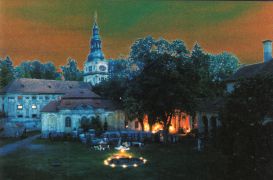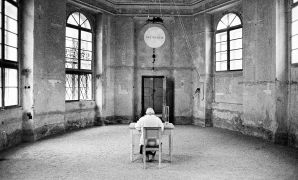„Has it ever occurred to you. Winston, that by the year 2050, at the very latest, not a single human being will be alive who would understand such conversation as we are having now?“
George Orwell, Nineteen Eighty Four (1949)
At first glance, stories are rather straightforward affair: to tell somebody about something what did, will or could happen sometime somewhere to somebody. Stories come to life through words, images, sounds, or gestures: their foundation though is a vital community. Stories form a membrane pulled between reality and fiction, narrator and listener, past and present, the possible and the fabulous, memory and oblivion. Neither true stories nor fairy tales are necessarily self-apparent. They can easily evaporate, slip through one´s fingers beyond and manipulation, and at the same time can become menacing instruments of though domination. This is why the ruling classes and institutions have always sought to oversee the profession of storyteller and to command the motherboard of narrative elements. Storytelling and their dispersion today are mainly the domain of the mass media, of its moguls, strategists and specialist. It is as if people have forgotten their own natural gift for creating and telling stories and, essentially for making time to listen to them.
Walter Benjamin already articulated the crisis of the Narrator just before the Second World War. The disappearance of the artwork´s aura in the age of mass media and omnipresent reproducibility refers only in part to our contemporary situation. Narrative is still somewhere around and beyond us, enhanced by media networks pulverized into prefabricated schemas, which only simulate the ancient magical ritual blended of the act of storytelling. They are blended and packaged into ready-made, ersatz plastic stories, poured daily through monitors into our homes – a myriad of seducing and pulsing images, words and sounds – the obscene Talk Show of a Thousand and One Nights and Days. The industrial production of narrative has insulated us from the veracity of our own real stories. “this is your story; we made it especially for you: no need to bother with your own thoughts: your mind and senses will be constantly saturated and stimulated by this “Brand-New Universal and Spectacular Hyper-Story".
Could all those technical gadgets – visual and audio-visual apparats for more efficient labour and communication – have weakened the fragile narrative potential and interchange among people, history and spiritual environment? Is it possible that technology has somehow absorbed the time and space available for telling and cultivating stories? Has it transformed narrative into information?
Time in its contemporary economic, technological and cultural development, is the factor which determines every form of personal and social life. We live in a global numerological machine-building, where interconnected digital units mercilessly compute every millisecond separating us from death. “Your software has expired, contact your system administrator.” Time is being transformed into a commodity. In the Age of Chronocracy (term by Peter Weibel), the lack of time has become a social phobia just as, for example, the precarious condition of our environment. Only a few – those who actually have this truly irrecoverable resource at their disposal – are questioning who and are the forces planning and shaping the order of people´s personal time. And isn´t this control a new inconspicuous, subliminal form of slavery?
The act of narration, the story, is the archetype of the “time machine”. It is peculiar intersection of physical and biological time – a memo machine to socialize the tribe as well as to sustain the interface between wet psychic force and dry mechanical patterns. To imprint a narrative onto clay, paper, vinyl, celluloid, or an electronic system is historically unavoidable, seductive, exciting, dangerous and … painful, perhaps because the rate and duration of a human life and of a machine is in immeasurable units. Media is the manifestation of human hope for eternal life. This is perhaps why we depend so much on the cultivation of mechanical memory and use it as the depository of our personal and social narratives and stories. Never in history have so many collective and individual narratives from all times, cultures and locations been collected, and interlinked – but also lost and forgotten. Who knows what could happen to them and to us?
The Fairy-Tale Symposium was a meeting of about two dozen artists from various places and cultures who came to spend one month discussing the possibilities of narratives in different disciplines and media. They gradually stopped sitting in front of their computers using the Internet to communicate and started talking to each other and relating immediate stories.
Prague, January, 2000



